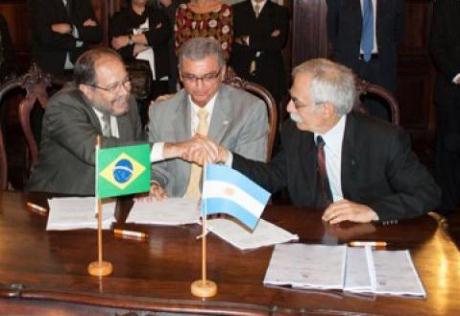Twin research reactor contract for Invap
09 May 2013
Nuclear technology firm Invap will construct two research reactors, one in Brazil and one in Argentina, under a contract signed with the two countries.
 |
| The signing of the contract in Rio de Janeiro on 6 May (Image: Invap) |
Invap signed the $12 million contract with Argentina's National Atomic Energy Commission (CNEA) and Brazil's National Nuclear Energy Commission (CNEN). The reactors have been designated the Brazilian Multipurpose Reactors (RMB) and the RA-10 in Argentina.
The Opal (Open Pool Australian Light-water) design which Argentina's Invap supplied to the Australian Nuclear Science and Technology Organization (Ansto) is the reference for this binational project, according to Argentina's ministry of federal planning.
The reactors will be used for the production of medical radioisotopes, as well as irradiation tests of advanced nuclear fuel and materials, and neutron beam research. Between them, the new Argentine and Brazilian reactors will provide the capacity to supply some 40% of global radioisotope demand. Argentina currently accounts for 5% of world radioisotope production, with the remainder supplied by Australia, Canada, France and South Africa.
Under a related contract signed in January 2012, Brazil's Intertechne is developing the conceptual and basic design of buildings, systems and infrastructure for the Brazilian Multipurpose Reactor (RMB). The project will be built in the municipality of Iperó in São Paulo state and is due to start operating in 2018.
Details about the location and timescale for the construction of Argentina's AR-10 were not disclosed.
Growing cooperation
The research reactor project is part of the growing bilateral cooperation in nuclear energy between Argentina and Brazil. In February 2008, Argentina and Brazil signed a declaration to jointly develop nuclear power reactors, uranium enrichment as well as nuclear naval vessels. Shortly after the signing of that agreement, the CNEA and CNEN began work on the formation of the Binational Commission of Nuclear Energy (COBENA), which was launched in early 2010.
In August 2010, Brazil's then President, Luiz Inacio Lula da Silva, and Argentina's President Cristina Fernandez de Kirchner instructed COBENA to 'intensify efforts to implement and integrate cooperation projects which have been identified as priorities for the advancement of bilateral cooperation in the field of peaceful uses of nuclear energy, particularly the flagship projects of bilateral strategic relationship and high visibility projects, such as joint development of a multipurpose research reactor.'
An agreement for the joint construction two research reactors was signed in January 2011 by Argentina's minister of planning Julio De Vido and his Brazilian counterpart Fernando Pimental.
Argentina and Brazil already use nuclear energy on a small scale. Both countries currently have two nuclear power reactors each in operation.
Researched and written
by World Nuclear News